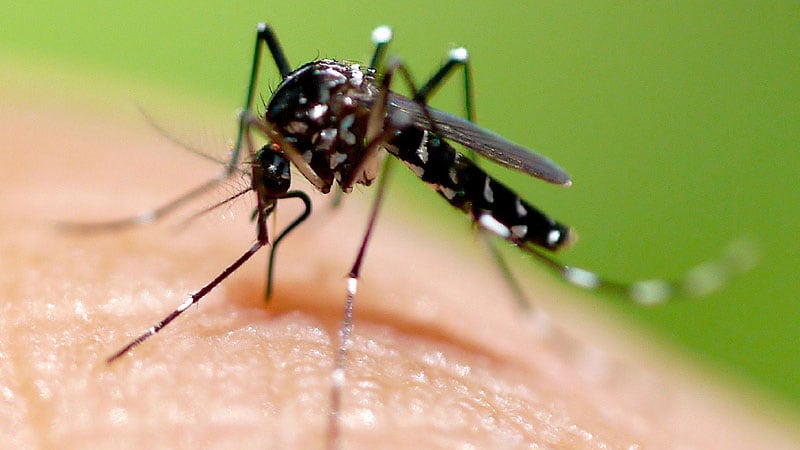Ah A new study with a modest title Released in New England Journal of Medicine Contrary to the staggering 77% protection reported for prevention Dengue fever Infection due to Wolbachia infection Aedes aegypti mosquito.
AWED (“Applying”, a cluster randomized clinical trial Wolbachia To eradicate dengue “) The study was conducted in Yogyakarta, Indonesia, and was led by Professor Adi Utarini and Dr. Cameron Simmons of Gadjah Mada University. World Mosquito ProgramIn partnership with Oceana Director, Tahija Foundation and Monash University.
One of the reasons why Yogyakarta was chosen as a research site is consistently Ranked in the top 10 states 1Dengue fever in Indonesia. For the investigation, investigators divided the area of Yogyakarta into geographical clusters.Investigators were released in random halves of those clusters Aedes aegypti Infected mosquitoes wMel strain Wolbachia pipientis It grows throughout the area. The other half did not intervene.
Researchers recruited patients aged 3 to 45 years who had a fever and tested for dengue. This type of trial is a type of cluster randomized trial. Test negative design. Rather than tracking everyone living in the cluster to see who became ill, comparing all patients who showed fever and those living in treated and untreated communities Was compared.
In the control group in the untreated area, 9.4% of patients were infected with dengue fever. Patients in areas treated with Wolbachia had a reduced infection rate of 2.3% and a protective effect of 77%. Levels of protection were similar for all four dengue serotypes. Even more pronounced was the hospitalization rate, which was 0.4% in the treatment group versus 3% in the control group, with a protection rate of 86%.
Simmons said Medscape Medical News The WHO Vector Control Advisory Group reviewed the trial and, based on such positive results, concluded that WHO could proceed with formal policy recommendations to support the deployment of Wolbachia.
Wolbachia
Wolbachia is a naturally occurring bacterium.When introduced Aedes aegypti Mosquitoes, Wolbachia prevent dengue fever. However, researchers are not sure how this will happen. Simmons, one of the lead researchers in the AWED trial, made two hypotheses in an interview with Medscape. Lipid,inside Aedes aegypti cell. Second, Wolbachia triggers an innate immune defense mechanism within mosquito tissues that may contribute to virus suppression.
In addition to reducing dengue, the study’s authors state that laboratory studies also suggest that Wolbachia “may attenuate the propagation of dengue.” Zika, Chikungunya fever, yellow fever, And Mayaro virus Aedes aegypti“
This type of research and intervention requires community education on the natural history of biology, mosquitoes, and dengue infections. Simmons recognizes Utarini for many of his relationships with the successful communities that made this study possible. “I think this is a great testament to the community and community leadership in many ways.”
Impact of Wolbachia on viral infections
Dengue fever Infected people double every 10 years According to the CDC, every year 100 million people get sick The infection has killed 22,000 people.
Timothy Endy, MD, an emeritus professor at SUNY Upstate Medical University in Syracuse, NY, told Medscape that it was due to climate change, urbanization and waste. Aedes aegypti mosquito. “The risk of dengue and other flaviviruses spreading in the United States is fairly low,” he said.
Endy noticed regular dengue fever in Florida, Texas, and Hawaii, so he “sees Wolbachia being released in certain parts of the United States, especially along the southern border. Is done. [the area with] Highest risk. Aedes aegypti And Aedes albopictus Is widespread in the southern United States for a variety of reasons, including climate change, warming, and rising humidity. Everything contributes to the diffusion of this particular vector. “
The World Mosquito Project has told Medscape that “currently, deployment costs are less than $ 10 per person,” and we are working towards $ 1 per person. Furthermore, in modeling research, this technique is “Cost effective“
Several strategies have been adopted to reduce mosquito-borne infections, including new vaccinations. Oxytech genetically modified mosquitoes, Reduce the number of mosquitoes. And Wolbachia. The latter two technologies are expected to reduce infection by viruses such as Chikungunya and Zika as well as dengue.
Endy was A member of the consulting team for this Wolbachia project More than 5 years ago.
New England Journal of MedicinePublished online on June 10, 2021. Full text
Dr. Judy Stone is an infectious disease expert and author of the book. Resilience: A story of a family’s hope and victory over evil With Conducting clinical research , An essential guide to the topic.You can find her drjudystone.com Or on Twitter @drjudystone ..
Follow Medscape for more information. Facebook, twitter, Instagram, Youtube, And Link destination




